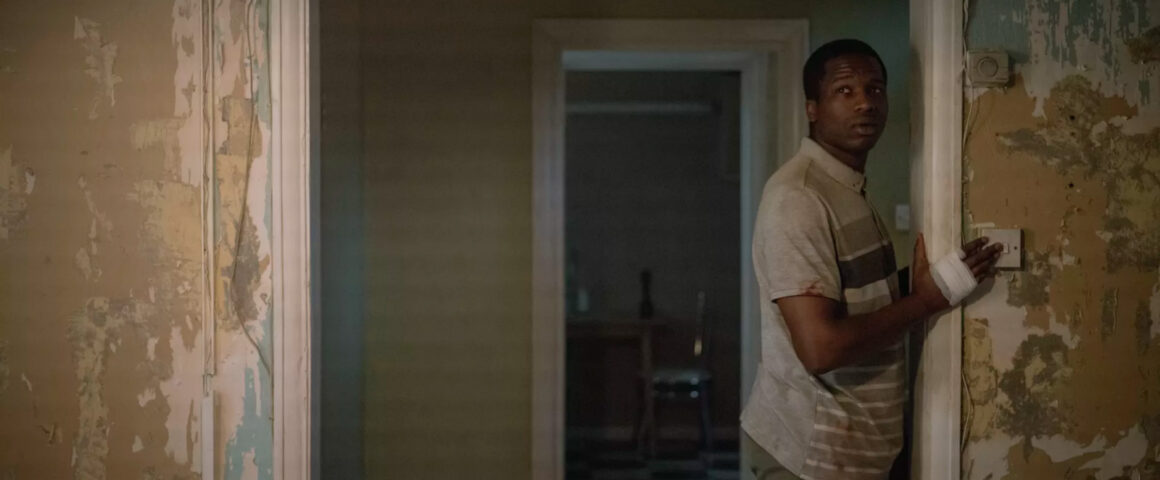The ghost story is common in the cinematic output of many countries. From the Mexican “The Devil’s Backbone” to the Spanish “The Orphanage” to the Japanese “Dark Water” and the British/Iranian “Under The Shadow,” as well as the renowned classics “The Haunting” and “The Innocents,” the ghost story has proven itself versatile and adaptable to a range of contexts.
His House offers features that are familiar for the genre, yet also provides distinct aspects. We see the tropes of sudden appearances and disappearances, while the protagonists are troubled by a tragic past. Are the strange occurrences taking place around them their grieving minds playing tricks on them, or is there actually something supernatural going on? For the audience, the haunting serves as a manifestation of sorrow, reminding us that misfortune cannot be easily escaped from. Director Remi Weekes also injects a hitherto (for this critic) unseen aspect, which makes the horror and the sorrow all the stronger — the refugee experience.
The film follows Bol (Sope Dirisu, “The Huntsman: Winter’s War”) and Rial (Wunmi Mosaku, “Fantastic Beasts and Where to Find Them”) Majur, a South Sudanese couple who have fled violent attacks in their homeland. Arriving in Britain, they are placed into the asylum seeker program and granted a house in a suburban area. Once there, the house seems even less welcoming than the officials who will determine their fate. Bol continues to insist that everything will be alright, they simply have to adjust. Rial is far less trusting and starts to believe they should return from whence they came. As events escalate, questions over their past as well as their future, and the deep-seated and therefore constantly troubling notion of belonging become ever more pressing.
Refugees and asylum seeking are hot topics, dominating the news and, arguably, relevant to significant policy changes in recent years. Whatever one’s position may be, whether we welcome or reject those seeking refuge in Britain, America or elsewhere, it is fair to say that the actual experience is unique and unlike anything the standard viewer, indeed the viewer that this film is aimed at, is likely to have had. It is therefore to the film’s great credit that it makes the experience completely understandable and palatable. The great critic Roger Ebert said that cinema is a machine for generating empathy, and His House is a magnificent demonstration of cinema’s ability to make experiences relatable. Weekes focuses on basic emotions while making clear the context of Bol and Rial’s experiences. This includes flashbacks to their journey, jostling for space in a bus and a truck, fleeing armed gangs and a truly terrifying ocean voyage where other refugees horrifically drown. The flashbacks haunt the central characters, but their current position is far from friendly, as the impersonal and authoritarian figures of the UK government create further fear and uncertainty, micro-aggressions and condescension indicating how grateful they expect Bol and Rial to be.
Fear mingled with hope, bolstered by love but tinged with sorrow — this is the emotional palette of His House, conveyed through lingering shots on the faces of the superb lead performers. The chemistry between Dirisu and Mosaku is genuine, complete with warmth as well as irritation — they feel like a real couple, who have been through a tremendous trauma and have different views on how to handle their current situation. Around this true-to-life couple, Weekes creates a keen sense of the uncanny, as deep focus shots express the threatening darkness of the house and the cavities of a wall become a site for dread-filled exploration. Surreal effects sequences present the agonizing history of the protagonists, as the waters of the crossing overflow from their memories to surround them at the kitchen table, while ominous figures move from sudden appearances to outright attacks.
For a British viewer especially, the house and estate are very familiar, and yet the unfamiliarity experienced by the characters is deeply unsettling. Production designer Jacqueline Abrahams turns this terraced house into an eerie space, while unfriendly locals add to the sense of menace. Weekes pays explicit homage to “The Shining” in one sequence where Rial searches through a maze of alley ways, and a creepy neighbor (complete with cat) casts a withering eye on these unwelcome guests. References to African folklore make the situation stranger for the viewer, yet also makes the experience of the characters more relatable: The folklore is something they understand and may even be a strange form of comfort in this very strange land. Yet the film does not skimp on the scares, as sudden jumps, a crawly atmosphere, faces in the walls, outbursts of violence, protracted encounters with demonic visages — all ensure that you get your horror beats.
Furthermore, the film also includes revelations that are not only shocking but devastatingly sad. The opening of the film as well as initial discussions suggest one aspect of Bol and Rial’s journey, but later events, possibly in the minds of the characters, possibly not, present something more that may have the viewer in tears. It is hugely impressive that, in his feature debut, Weekes is able to interweave human drama and political expediency, human suffering and supernatural haunting, with such confidence and aplomb. This potent combination ensures that His House is one of the strongest horror films, and indeed films period, of the year.



